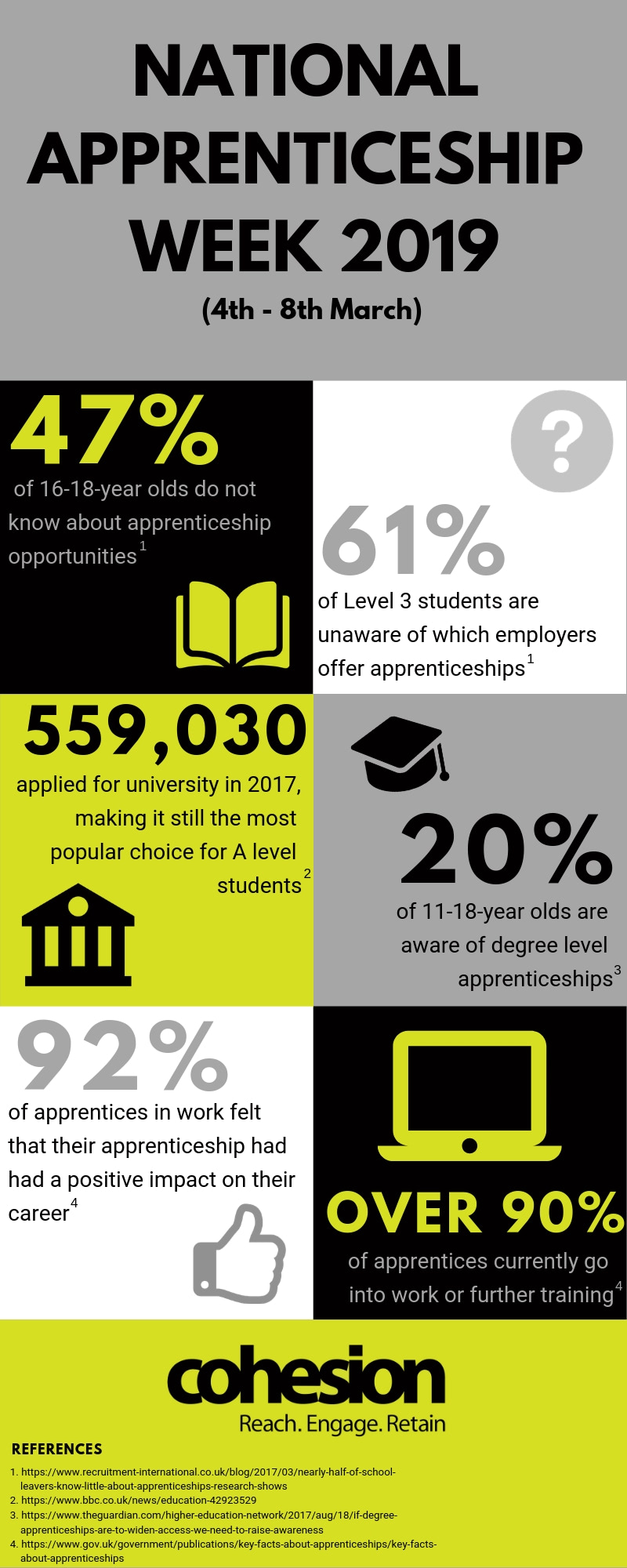Everything you need to know about applying for an apprenticeship #NAW19

Ahead of National Apprenticeship Week, (4th – 8th March), we talk to Deborah Edmondson, Early Talent Director at Cohesion Recruitment, for her advice on guiding you through the apprenticeship process:
Apprenticeships are a great opportunity for people to gain practical skills, knowledge and experience through a combination of work, training and studying, enabling you to ‘earn while you learn’, with an alternative pathway to higher education.
Yet shockingly, statistics reveal that many 16-18-year olds do not know about apprenticeship opportunities and where to go for more information, with only limited information filtering through to them from schools.
With university fees and living expenses at a record high, degree-level apprenticeships are definitely worth having a look at before committing to a university, even with increasing numbers of unconditional offers on the table, the traditional pathway is not for everyone.
Apprenticeships not only provide you with a great opportunity to earn a salary whilst training but will set you up with solid work experience and industry contacts whilst some of your peers may be still studying!
How to find the right role
Finding the right apprenticeship can be difficult, it’s hard to know where to find out more about the different roles available and what they entail.
Try visiting www.apprenticeshipjobsearch.co.uk as a starting point – there are lots of different jobs on offer and some you may not have even considered before!
Key things to consider when looking for apprenticeships
- Do you have the necessary qualifications? – entry levels for apprenticeships really vary. Some require 5 GCSEs and others such as STEM related apprenticeships may require specific A Levels
- Are you a practical individual who enjoys ‘learning by doing’? You will be expected to get stuck in, ask questions and use your initiative
- Where is the job based? – some roles require you to relocate or move around to training centres or sites. For many people this is a great opportunity, but it’s not right for everyone.
- Is the wage and industry right for you? – Before applying you need to ask yourself some honest questions. Will you manage on the salary on offer? Can you commit to the training programme? Talking to other apprentices about their experience can really help you to make up your mind.
Why your CV should stand out
When looking for the right apprenticeship for you, you should spend some time adapting your CV, so it is relevant for the role / company.
It really needs to communicate to the employer why you are the ideal candidate for the job, sotailor your CV for each job application, using the job descriptions provided, making sure to highlight key attributes relevant to the role.
How to compile a good CV
Spend some time drafting your CV, make sure it:
- Showcases your skills – any potential employer wants to know why you are the right person for the role. Make sure you discuss the skills you have developed from previous work experience, sporting endeavours or extra-curricular activities such as the Duke of Edinburgh Award scheme. Don’t forget to mention any relevant volunteering positions or charity work you’ve been involved in.
- Talk about your hobbies and interests – talking about your hobbies and interests can tell an employer more about the type of person you are, make especially sure to highlight those which are relevant to the position on offer.
- Proof-read it before sending it out! Whether a CV, online application for or covering letter it is one of the most important things you can do before sending on to an employer. Make sure you include your contact details so that a potential employer can get hold of you (it’s also worth ensuring you have a ‘sensible’ voice mail message on your phone and a suitable email address when it comes to applying for jobs – employers want to see you are taking your application seriously!)
How to prepare for interviews
Once you’ve secured an interview, there are a number of things you can do to prepare. An interview provides the perfect opportunity to showcase your passion and interest for the industry, as well as demonstrating to the employer that your personality is a perfect fit for the culture of the workplace.
Make sure you:
- Research the employer – In a lot of job interviews you can expect to be asked what you know about the company, this gives you a chance to show your interest in the organisation and talk about why you want to work there.
- Plan ahead – Don’t leave it until the morning of the interview, make sure you know how to get there, what you need to bring and what you’re wearing. Doing this can help you to remain calm before the interview.
- Prepare some questions – Doing this can really impress an interviewer as many people fail to prepare questions, in many circumstances it can make you stand out as a candidate and also shows that you have done your research into the company and the role eg. show an interest in the training and development on offer, or the company’s future plans
Good luck!
Deborah Edmondson, Early Talent Director at Cohesion Recruitment












Responses